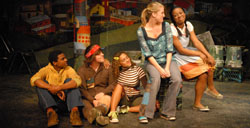In this country and this city, homelessness is an accepted feature of the urban landscape. We walk past it, clumsily hand it our change, and continue on.
 In our classrooms and in our books, astronomical figures document the social epidemic. The numbers are incomprehensible, and we read past them as if they were only ink on paper.
In our classrooms and in our books, astronomical figures document the social epidemic. The numbers are incomprehensible, and we read past them as if they were only ink on paper.
The Nomadic Theater Group, distinct in Georgetown’s dramatic community for melding art and social justice, has attempted to combine these two ways in which we experience homelessness. Essentially, Address: Unknown juggles humanity with numbers.
The relatively young group of actors wanders through the foreground of a colorful set and proceed to don one persona after another as they introduce the audience to the many faces of America’s homeless. The play’s director and author, Kevyn Bowles (COL ’09), spent a year researching and interviewing members of D.C.’s homeless population, in order to give this production the biting sense of reality that comes from knowing that an extraordinary story is true.
Although Address: Unknown is not a political play in the “red vs. blue” sense of things, more than once the audience is subjected to sermons demanding “free housing” or, when they want to mix it up and sound professional, “units of housing.” After two or three of these speeches, delivered hyperbolically by the cast, it’s clear that this play is about concepts, not people, and self-conscious art, not the subject.
After sitting through the roughly 90-minute production, you might ask yourself why this message was not condensed into a pamphlet or essay, where it might abandon all pretense of artistic quality. Instead, the play stumbles on as an example of what happens when art follows concepts, and not the other way around.
In an attempt to interpret the intangible statistics on homelessness, the play slips into a certain schizophrenic aimlessness. No actor maintains a single character for more than 15 minutes, leaving only the extraordinarily empathetic with an emotional connection to the play’s names and stories. The other half of us will be reminded of channel surfing through early afternoon soap operas.
Address: Unknown employs almost every conceivable artistic medium as it sings, screams, dances, changes costumes, and even whips out shadow puppets. At least in our age, the benefits of artistic minimalism are deified, and every word in a poem or scene in a film has to earn its place. Address: Unknown ignores that principle, drowning the audience in as much media as it does characters.
It is a pity, because true homelessness is almost archetypically minimal—minimal clothes, shelter, and dignity. Perhaps this is the right kind of play for your niece or nephew—that is, if you want to introduce them to “homelessness” the idea but want to keep them entertained by songs, dancing, and A Bug’s Life metaphors.
If you’re looking for the grab-me-by-the-neck-and-shake-it power of 21st-century drama, you won’t get it here. If you want a gripping and informative portrayal of homelessness in America, there are books that are better worth your time.






I would counter this view that homelessness is an issue of minimalism. Having a small amount of food or shelter to survive on may me minimal, but the reason for hunger and homelessness are certainly not. I believe it is important to highlight the complexities of this issue, and if Address: Unknown attempts to give a full-viewed account of an issue in order to inspire its audiences instead of bogging them down in a singular story, then that has merit. I do not believe this is meant to be a show that spouts statistics, but rather a show about giving hope and a voice to a community. And to say that a show that is itself based an the actual words of formerly homeless individuals and even displays their recorded faces during the show, to say that it somehow fails to represent the people and opts instead for ideas misses the history and mission that went into the production. If for nothing else than to show support for the people who gave their stories to make this show possible, to give their voices meaning, everyone should see this show.
This article, quite frankly, is an embarrassment to The Voice. It’s half review, half critical masturbation.
The tone you affect indicates that you revel in giving the production a poor review: One example is your referring to “A Bug’s Life metaphors,” seemingly because you like the sound of that term, however misleading it might be. Earlier on in the article, you bellyache over “sermons demanding free housing,” suggesting that these “sermons” show that the play is “about concepts, not people.” The fact that such “sermons” were taken right from the mouths of DC’s homeless must not have influenced your perspective on that… The play was clearly focused on expressing the homeless’ point of view, so why should its writer exclude their political opinions?
At the beginning of your review, you say that “essentially, Address: Unknown juggles humanity with numbers.” While I can’t say I had any idea of what the hell you were talking about, it seems from the rest of your review that you felt that the show’s writing was laden with “intangible statistics.” That’s patently false. Most of the show was anecdotal.
Just some thoughts.